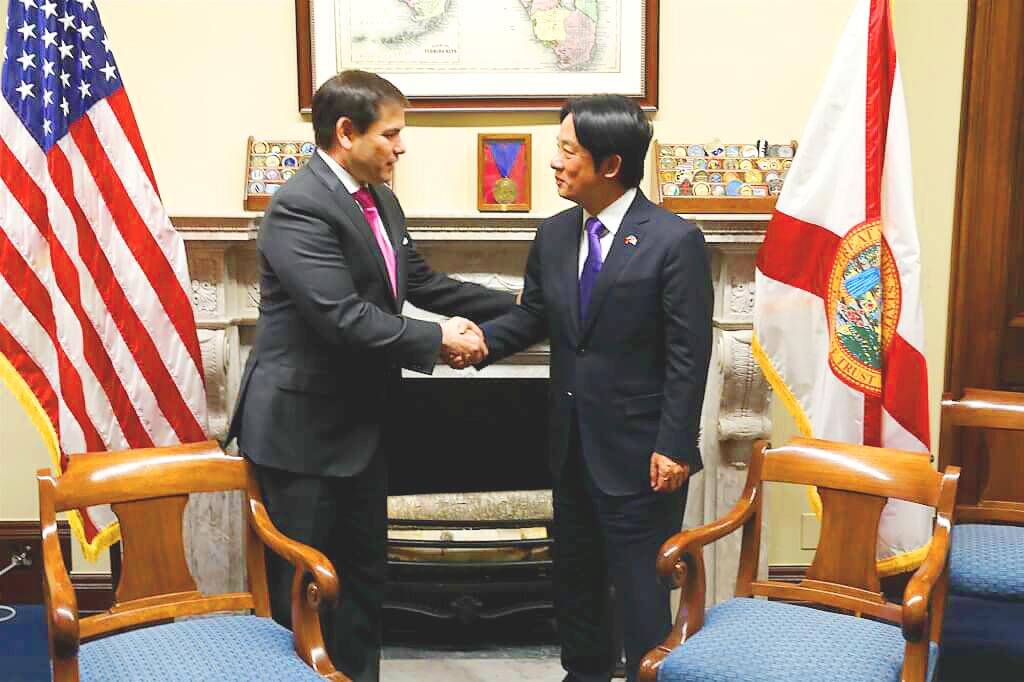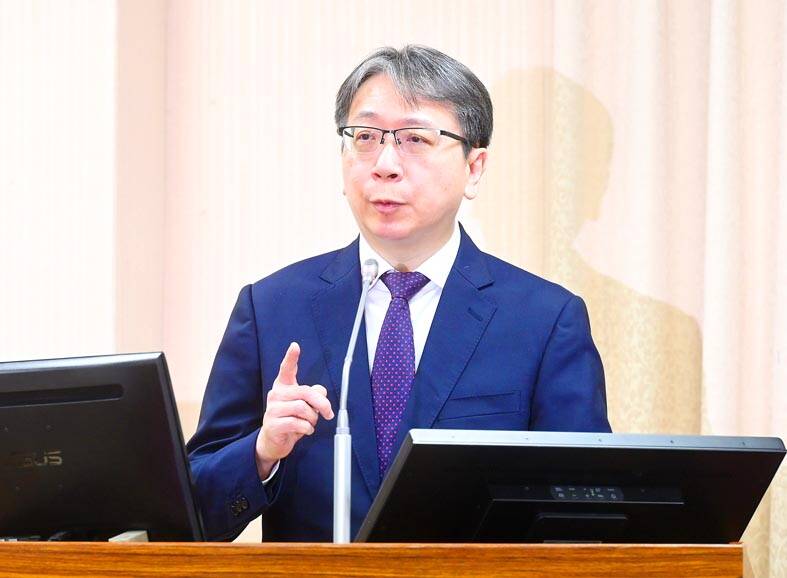US president-elect Donald Trump seems to be appointing senior national defense and diplomacy officials based on the principles of “America first” and “containing China,” National Security Bureau (NSB) Director-General Tsai Ming-yen (蔡明彥) said, without commenting on specifics.
The incoming Trump administration could propose a comprehensive strategy targeting Beijing, from geopolitics, economic decoupling, supply chain security and export restrictions, Tsai said on the sidelines of a legislative session in Taipei.
On Taiwan-US relations during Trump’s second presidency, Tsai said Taiwan would maximize the shared interests of both countries to continue promoting strategic cooperation.

Photo from Marco Rubio’s X
The main goal for Taipei would be to show Washington and the international community that it is an indispensable partner in terms of economics, trade and security; not someone that does nothing and “enjoys the fruits of other’s labor,” Tsai added.
He also said that the Taiwanese and US governments have enjoyed solid collaboration for decades.
The government has expressed its gratitude to outgoing US President Joe Biden for his support over the past four years and is looking forward to working with Trump for the next four years, Tsai said.

Photo: Wang Yi-sung, Taipei Times
Some of the top positions in Trump’s incoming administration are to be filled by figures known for their hawkish views on China, signaling a tough line on Beijing from national security to trade.
Trump has nominated US Senator Marco Rubio as his secretary of state and has picked US Representative Mike Waltz, a retired Green Beret and a China hawk, to be his national security adviser.
Rubio is known for his hardline policies on China and Iran. He has also proposed several Taiwan-friendly bills.
Meanwhile, senior security officials said that Taiwan does not have a “concrete list” of new arms deals to put to the incoming Trump administration, but is keen to discuss how to boost the nation’s defense.
Sources have previously said that Taiwan might place large new arms deals early in the next US administration to show that it takes seriously Trump’s comment that Taiwan should pay “protection” money.
Taipei is considering buying a big package of weapons from the US to demonstrate its commitment to self-defense, the Financial Times also reported this week.
“Currently, we do not have any such concrete list, but we welcome advice from all sides, with the most important thing being how to boost self-defense capacity,” a senior Taiwan security official told reporters in Taipei, speaking on condition of anonymity.
“Taiwan is very willing to discuss with all like-minded partners, especially the US, how to continue to reinforce Taiwan’s defense capacity,” the official said.
Taiwan already has an order backlog of about US$20 billion and last month announced an almost US$2 billion order for missile systems.
The nation’s total defense spending has jumped about 80 percent since the Democratic Progressive Party entered office in 2016, the official said.
“Our commitment to self-defense would only get stronger, not weaker,” the official said.
The government regularly holds discussions with major US parties and think tanks on whether the nation’s military hardware and software are effective enough to counter a hypothetical Chinese attack, another security official said on condition of anonymity due to the sensitivity of the matter.
Such discussions include whether Taiwan should massively boost the size of its drone fleet capable of striking high-value Chinese military assets, the second official said.
“Such reviews are normal,” they said, adding that Taiwan has not started a new round of arms talks with the US.
“There are a lot of discussions and recommendations. We welcome everything that is beneficial to boosting Taiwan’s defense,” they said.
Four years ago, President William Lai (賴清德), who was then vice president-elect, visited the US as a private guest, where he met with Rubio during the National Prayer Breakfast.
They talked about their meeting on a social media post afterward, with Lai saying that they discussed strengthening Taiwan-US relations and Taipei’s participation in global organizations.
Lai on X yesterday congratulated Rubio on his confirmation as US secretary of state.
He also thanked Rubio for his “staunch support for Taiwan and tireless efforts to defend freedom and human rights globally.”
“I look forward to furthering Taiwan-US relations to promote peace and prosperity,” Lai said.
Lai attended the National Prayer Breakfast along with then-Democratic Progressive Party legislator Hsiao Bi-khim (蕭美琴) — who became representative to the US in July that year — as “nongovernmental guests” in February 2020, a source familiar with the matter said yesterday.

Taiwan is stepping up plans to create self-sufficient supply chains for combat drones and increase foreign orders from the US to counter China’s numerical superiority, a defense official said on Saturday. Commenting on condition of anonymity, the official said the nation’s armed forces are in agreement with US Admiral Samuel Paparo’s assessment that Taiwan’s military must be prepared to turn the nation’s waters into a “hellscape” for the Chinese People’s Liberation Army (PLA). Paparo, the commander of the US Indo-Pacific Command, reiterated the concept during a Congressional hearing in Washington on Wednesday. He first coined the term in a security conference last

Prosecutors today declined to say who was questioned regarding alleged forgery on petitions to recall Democratic Progressive Party (DPP) legislators, after Chinese-language media earlier reported that members of the Chinese Nationalist Party (KMT) Youth League were brought in for questioning. The Ministry of Justice Investigation Bureau confirmed that two people had been questioned, but did not disclose any further information about the ongoing investigation. KMT Youth League members Lee Hsiao-liang (李孝亮) and Liu Szu-yin (劉思吟) — who are leading the effort to recall DPP caucus chief executive Rosalia Wu (吳思瑤) and Legislator Wu Pei-yi (吳沛憶) — both posted on Facebook saying: “I

The Ministry of Economic Affairs has fined Taobao NT$1.2 million (US$36,912) for advertisements that exceed its approved business scope, requiring the Chinese e-commerce platform to make corrections in the first half of this year or its license may be revoked. Lawmakers have called for stricter enforcement of Chinese e-commerce platforms and measures to prevent China from laundering its goods through Taiwan in response to US President Donald Trump’s heavy tariffs on China. The Legislative Yuan’s Finance Committee met today to discuss policies to prevent China from dumping goods in Taiwan, inviting government agencies to report. Democratic Progressive Party Legislator Kuo Kuo-wen (郭國文) said

The Ministry of Economic Affairs has fined Taobao NT$1.2 million (US$36,900) for advertisements that exceeded its approved business scope and ordered the Chinese e-commerce platform to make corrections in the first half of this year or its license would be revoked. Lawmakers have called for stricter supervision of Chinese e-commerce platforms and more stringent measures to prevent China from laundering its goods through Taiwan as US President Donald Trump’s administration cracks down on origin laundering. The legislature’s Finance Committee yesterday met to discuss policies to prevent China from dumping goods in Taiwan, inviting government agencies to report on the matter. Democratic Progressive Party